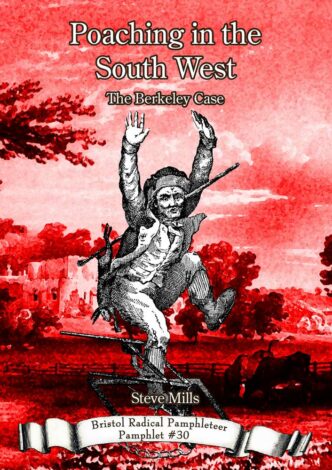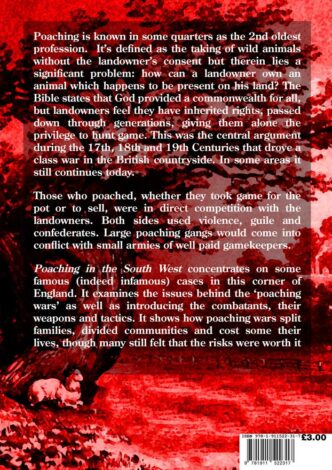Poaching is known in some quarters as the 2nd oldest profession. It’s defined as the taking of wild animals without the landowner’s consent but therein lies a significant problem: how can a landowner own an animal which happens to be present on his land? The Bible states that God provided a commonwealth for all, but landowners feel they have inherited rights, passed down through generations, giving them alone the privilege to hunt game. This was the central argument during the 17th, 18th and 19th Centuries that drove a class war in the British countryside. In some areas it still continues today.
Those who poached, whether they took game for the pot or to sell, were in direct competition with the landowners. Both sides used violence, guile and confederates. Large poaching gangs would come into conflict with small armies of well paid gamekeepers.
Poaching in the South West concentrates on some famous (indeed infamous) cases in this corner of England. It examines the issues behind the ‘poaching wars’ as well as introducing the combatants, their weapons and tactics. It shows how poaching wars split families, divided communities and cost some their lives, though many still felt that the risks were worth it.







as for salmon declining well i beg to differ take a lok at the rivers tyne or wear fish counts and they on the up google it also tees which look terrible but not all fish are counted as for recovery of rovers well look no further than the humber estuary its clean now ansd serve the rivers ouse/trent.don/derwent/wharfe/hull/aire and gypsy race the ouse/ure serves the nidd,swale,dewent.wharfe and aire,the ure serves swale and nidd swlae has cod beck, bedale beck and river wiske,as well as brompton beck,the ure serves the skell,laver,cover burn etc now i could go on for hours but i recon the anuel cont for the ure alone is in the region of 15k fish a yr easy as not all are counted esp in high water thats just one river that flows into the ouse/humber and theys lots of them,not including the trent which is a junction between ouse trent and both run to humber,salmon have been sighted in doncatser for a few yrs and even sheffield is seeing fish and the same fish that come from the don cathcmenat are being seen in derbyshire all coming form the river humber,the fish are special as thye leave the humber but turn right and down south unusual as the feeding forunds at sea are at greenland and faores ! so why they do this well they are stock from the river salmon trusts hatchery and they used soem norway stock and these fish travekl south then north why unusual well the last time any uk salmon did this was when we were joined to mainland europe what 20k-35k yrs ago,so the fish are using the old route form yrs ago interesting stuff fish are being seen in the centre of paris and aslo as far as basele in switzer land on the rhine which can cope with a easy 5 mill anuel run if its cleaned lower down and fish passes are catered for which indeed the french swiss and germans are doing so if it has a nuel run of say 250k till it settle then number will increase to millions per yrs so they aint doing that bad as a species its the sea trout that are on the decline not the salmon
its still like this now in 2107 landowners fixing extrotionate prices for a days fishing but its not all hadreded crims ive known 3 x policemen 1 fire chief for a english county,dog catcher,mines by the 100 scrap men (rag and bone) a doctor bank clerk loan shark univecity professor drug dealers bank robbers and of course the unemployed ! in 37 yrs poaching salmon from the river wear at druham ive been caught over 200 times and seen lots been caught by the environment agency and not once in 37 yrs has they been any sort of scuffle bettween both parties not saying it dont happen but we all have to live together in a tight community so violence was never something that happend we never took every singkle fish we put back fish that were in spawning colours etc most were top anglers fishing for england at one points some have written books about fly fishig etc so the romance if yer like that surrounds the poacher with his long coat hat dog/gun.fishing rod stood on the river bank/woods in the moonlight simlpy dont happen any more……….